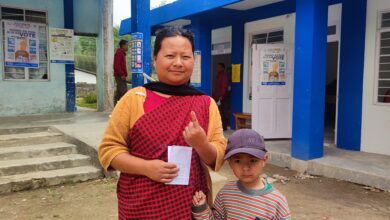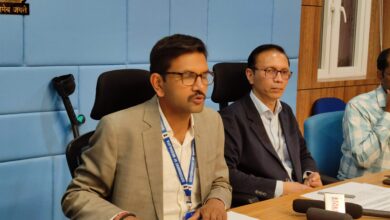‘Values of North-east communities can contribute to nation building’
Retd Archbishop Thomas Menamparampil looks back in time & suggests a collaborative way to move forward

Dr Thomas Menamparampil has been living in the North East for 70 years. The missionary, scholar, and writer recently released a book, Values Must Come Alive, that asserts how moral values, compassion, correlation, and ethics can help in the broader development of the human race. He also evaluates how the changing world, its degrading socio-political values, and non-inclusive economic advancement have left a section of people struggling for existence.
“The danger today is that the impersonality of the global economy uproots us from our respective communities where ethical values and moral concepts are generated, and we grow isolated, anonymous, and irresponsible,” he writes in his latest book.
He is critical of the way businesses, politics, the media, and society as a whole are functioning. He blames the nexus between the corporate, the political power, and the press, which is considered the fourth pillar of democracy, for social degradation and near-extinction of morals.
Menamparampil, who was nominated for the Nobel Peace Prize in 2011, also believes that the communities in the North East can add value to the growth of the nation as these are rooted in their traditions and values. In regard to living as a community, the author writes in his latest book, “Life together means relationships. Human beings are so inclined to bondedness and have such a strong sense of co-belonging, that relationships grow up spontaneously, first among family members, then among neighbours and friends.”
The 86-year-old retired Archbishop was the first Catholic bishop of Guwahati and has worked widely with different communities in Assam and other parts of the North East. After completing his studies in erstwhile Calcutta and Shillong, he joined the Don Bosco Technical School here and worked for many years in the field of education. In an interview a few years ago, he said he began his peace initiative in 1996 when he witnessed the despondency of lakhs of people in camps around Kokrajhar after they lost their dear ones and property.
In a conversation with Sunday Monitor, Menamparampil, who was in Shillong for the centenary celebration of the arrival of Salesians of Don Bosco in the North East, looks back in time and suggests a collaborative and compassionate way to move forward. He also talks about the insider-outsider problem and how communities here can collaborate in making India the leading nation in the world. Excerpts:
Looking back: 70 years in NE
Yes, it’s been a long time. In the past, the local communities lived in isolation. But with education and development, for instance building of roads, the collaborative process started. Then came statehood. The region has progressed and we are thankful to the Government of India for developing the education and healthcare systems in the northeastern states. We should also thank other civil authorities for their enormous efforts and sincerity in promoting the well-being of communities here. Missionaries too contributed to education. It was a process of collaboration.
In fact, if you compare the North East with areas which are central to the nation, then you will see that this marginal area has grown a lot. We hope that the missionaries and the intellectuals who stimulated thought among people will work together for a better future. So many of our young people are not only in different parts of India but also around the world playing significant roles. Some are missionaries, some are intellectuals, and some are contributors to society. This is just the first part. Greater things are ahead. All I want to say is that we should cultivate some optimism within ourselves and the communities. Many in mainland India think that people from marginal communities in this part of the country are a hostile force. But we can also stimulate mainland India with thoughts. There’s always something to learn from the tribal community. Some people, of course, do not like the word “tribal”. But these communities can teach the country a lot. These are communities in their simplicity. There are several value systems that they have not got rid of. We have much to contribute if we collectively do some amount of thinking about what our values are, what our system of thought is, our tradition, and inter-relationship that can help our race. There’s collaboration of so many hands here. Nobody complains about what job they have been given. They do whatever job they are assigned. This attitude will help in building the nation.
The insider-outsider issue:
Well, the patronising attitude should end. When that is there, then we are always at the permanent minority level, at the receiving end, and there is no collaboration. Prominent people, like Purno Sangma, could also influence national politics. So, we should understand that people from this region also have many things to contribute. I hope a time will come when this distinction between insider and outsider will go. But before that, some national policies need to be evaluated before these are thrust upon people here. For example, the implementation of Hindi language here that makes people anxious. The way the majority communities take advantage of minorities at times is very unkind. If the latter makes a mistake, the former can always correct it, but in a paternal way and not to the extent of exploiting them.
Having said that, minority rights have reduced greatly and are nearing extinction. That is a cause for concern for people in the North East. Some broad-minded leaders of our country have ensured the development of these communities, but there are some who have added to the anxiety of people here. We are hopeful that in the long run, there will be collaboration. All we need is a dialogue around preserving values, both at the national and community levels to ascertain what is good for humanity as a whole. India can become the guru of the entire world if we work together and not just boast (about individual greatness).
Militancy & North East
The peace that we have seen is that of silence because of caution. This is not actual peace. Peace will come when there is confidence among people. If they are not sure whether their big brother has clenched his hands to defend them or attack them. That is anxiety. Some level of peace has come but that is the result of common anxiety and not absolute confidence. However, we are not pessimistic.
When we talk about guns, we have to understand the reason. This is because of the hatred that is there among communities. And when this hatred is spread by a majority community, then you can understand the feelings of the minority communities. Over the years, hateful words against communities around the world have only increased.
~ Team Sunday Monitor




